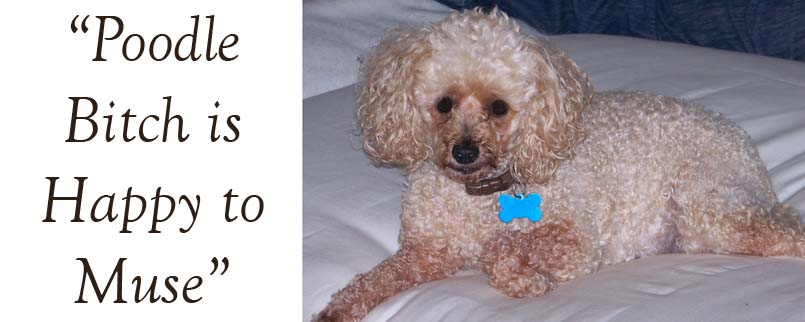
To Poodle Bitch, most "board" games might as well be called "bored" games, although she does on occasion enjoy the camaraderie and fun engendered by some of them -- Trivial Pursuit, Beyond Balderdash, and Scrabble in particular. Games like these enable you to get a better sense of your friends' personalities by displaying their knowledge and interest in the world around them. Because Scrabble is one of her more favored games, Poodle Bitch has noted with interest that the game makers are adding 3,000 new words to its official dictionary.
The game's publishers say the additions make this the "most comprehensive Scrabble wordlist ever produced," but that's doing little to soothe some players' ruffled feathers.
"I don't like slang words at all, but if they are going to put them in we will have to use them," Jean Gallacher, of Scotland's Inverness Scrabble Club, told The Scotsman. "I think there is too much slang in the English language as it is, with the way young people are talking."
Poodle Bitch would like to point out that many words that we today take for granted as perfectly acceptable began their lives as "slang" terms that the "young people" used. In fact, she notes that very often attempts to keep "slang" terms out of wider usage were actually snobbish, veiled attempts to keep people of the "lower orders" in their place. Dictionaries are decidedly undemocratic, as they are put together by small groups of people who make decisions as to what words to include and what to leave out based on their own prejudices, and deference to what has been considered "proper" before. This mindset was put into words by Samuel Johnson in the preface to his Dictionary -- the first major dictionary and the standard dictionary from which all subsequent English dictionaries were based:
Of the laborious and mercantile part of the people, the diction is in a great measure casual and mutable; many of their terms are formed for some temporary or local convenience, and though current at certain times and places, are in others utterly unknown. This fugitive cant, which is always in a state of increase or decay, cannot be regarded as any part of the durable materials of a language, and therefore must be suffered to perish with other things unworthy of preservation.
For instance, regarding the word "shabby," which was originally defined by Dr. Johnson in his Dictionary as "mean; paltry," he wrote,
A word that has crept into conversation and low writing; but ought not to be admitted into the language.
Poodle Bitch notes with some amusement that Dr. Johnson wrote that such a low word "ought not to be admitted into the language"; not, "ought not to be admitted into my particular vocabulary."
Johnson was motivated to write his dictionary by a fear that people would be unable to read Shakespeare, or Victorian writers, because the words used in their works would fall into disuse. So his inclination was to "fix" the language so as to slow its natural progression, the change of which was often accelerated by the "fugitive cant." He wanted to emphasize what he considered to be "durable" -- for instance, words Shakespeare used -- and to marginalize that which he did not. Dr. Johnson was remarkably successful in this endeavor. Human language has evolved far less since he wrote his first Dictionary than it ever did before. As invaluable as Poodle Bitch considers Dr. Johnson's work to be, she cannot help but marvel at the venality of his motives.
Poodle Bitch wonders if it is the prevalence of this attitude that has led to the decline of interest in the dictionary as a tool of reference. These antiquated, quaint printed relics cannot keep up in an age in which, if Poodle Bitch has a question about a definition of a word, she is just as likely to check the Urban Dictionary as Merriam Webster online.
Poodle Bitch knows few children, but those she does know crack open their dictionaries solely because a teacher has specifically assigned it. And, as for Scrabble, Poodle Bitch is only a casual player, and only uses the "official" dictionary in online versions of the game.
As far as Poodle Bitch is concerned, the idea of an "official Scrabble dictionary" is as antiquated as the idea of "a dictionary." So it has added words such as "grrl" (why only two "r"'s, by the way?), "thang," "innit," and "MySpace" (there is a word that would have been relevant five years ago)? This will affect very few of us.
Poodle Bitch believes that is a good thing.



No comments:
Post a Comment